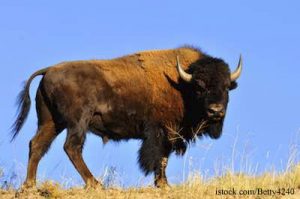An article in BMC Veterinary Research states that E. coli O157 has been found in bison retail meat and has been isolated from feces at slaughter houses on on bison farms. This is distressing, since cattle are already well documented E. coli O157 reservoirs, and bison is considered an alternative to beef.
 Bison and cattle have common ancestors and lineage. The scientists found that the epithelial cell markers in the GI tract of bison and cattle were similar. E. coli O157 adheres to RAJ squamous epithelial cells (RSE) in both animals. The authors conclude that bison are “likely ‘wildlife’ reservoirs for E. coli O157, harboring these bacteria in their gastrointestinal tract.” That means that bison can serve as reservoirs for E. coli O157 in the wild.
Bison and cattle have common ancestors and lineage. The scientists found that the epithelial cell markers in the GI tract of bison and cattle were similar. E. coli O157 adheres to RAJ squamous epithelial cells (RSE) in both animals. The authors conclude that bison are “likely ‘wildlife’ reservoirs for E. coli O157, harboring these bacteria in their gastrointestinal tract.” That means that bison can serve as reservoirs for E. coli O157 in the wild.
Bison meat was implicated in a multi-state E. coli O157 outbreak in 2010. That outbreak sickened 7 people and prompted a recall of Rocky Mountain Natural Meats bison products. More than 60,000 pounds of ground and tenderized steak bison products were recalled. PFGE tests showed that they were all sickened by the same outbreak strain of bacteria. E. coli O157 are implicated in more than 60,000 illnesses, 2,000 hospitalizations, and 20 deaths every year in the U.S.




